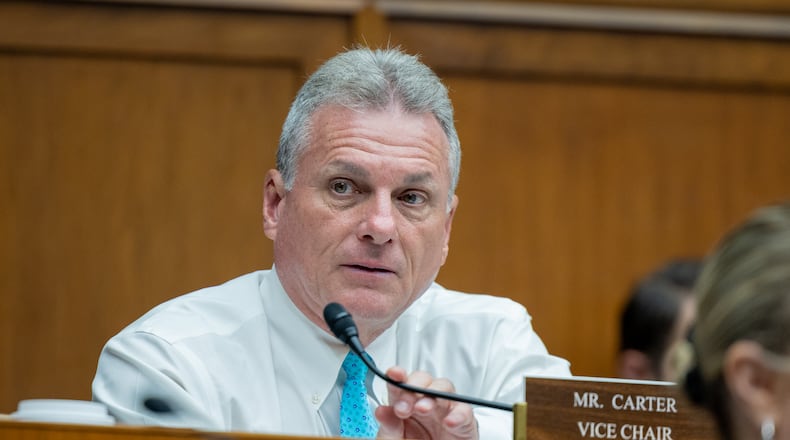WASHINGTON — When members of the U.S. House return Tuesday from a long weekend back in their districts, they will be faced with the reality that there is no clear path to pass short- or long-term funding legislation to avoid a government shutdown on Sunday.
And part of the reason is because Republicans, including those in Georgia, have different ideas on how to move forward.
U.S. Rep. Marjorie Taylor Greene has pledged to oppose any legislation that does not strip funding for Ukraine. U.S. Rep. Andrew Clyde has backed border security legislation and defunding the offices of prosecutors who have launched investigations of former President Donald Trump. Clyde and other lawmakers have successfully pushed House Speaker Kevin McCarthy on another concession: putting more of the individual long-term appropriations bills on the floor for votes.
But it is unclear whether any of this will lead to progress. Every time McCarthy has attempted to appease one bloc of Republicans in recent weeks, he has lost enough support from another to keep him from being able to pass funding legislation with GOP votes alone. But he has thus far not negotiated with Democrats, knowing that doing so will likely trigger a far-right revolt that could cost his speakership.
Republican members were sent home early last week, and many of them lamented that they had not been forced to stay in Washington to work through their differences with a shutdown looming. Some of them are calling on McCarthy to bring a short-term spending package, known as a continuing resolution, to the floor for a vote.
“We should be closing the border, not the House,” U.S. Rep. Buddy Carter, R-Pooler, said Friday. “Let’s pass a CR with spending cuts attached, avoid a shutdown, and continue discussions about how to save the country from $33 trillion in federal debt.”
A government shutdown on Sunday could mean furloughs for hundreds of thousands of federal employees, and those deemed essential would be required to show up for work without receiving a paycheck. Access to certain government services could be limited or require longer waiting times, and if there is an extended funding lapse, everything from the court system to safety-net programs would cease to operate.
U.S. Rep. Austin Scott, R-Tifton, also said he would have preferred not to have been told to head home over the weekend. But he laid the blame on the five Republicans who voted with Democrats to block progress on a defense appropriations bill. Greene was among the five.
Democrats have consistently voted against the GOP proposals because they include steep cuts in federal spending and new anti-immigration, anti-LGBTQ and anti-abortion policy directives backed by conservatives.
“It is this cooperation between the Democratic Party and the five Republicans that leads me to believe the government will shut down even though well over 90% of Republicans want to keep the government open, provided the Democrats would agree to border security,” Scott said in an email to constituents.
Over the weekend, the House Rules Committee voted along party lines to bring four additional appropriations bills to the floor this week. Their passage won’t avoid a government shutdown because the Democratic-led Senate won’t have anything to do with them, but the thinking is if Republicans can get something moving in the House it puts them in a better position to negotiate with the Senate.
But that still requires McCarthy to find the votes even for procedural steps to advance these bills. He wasn’t able to do that last week, partially due to opposition from Greene. The Rome Republican has already said she won’t support the new bills for the same reason: They contain money to help Ukraine in its war with Russia.
“Voting yes ... means more money for Ukraine,” she wrote in a statement Sunday. “It’s that simple. No one who wants peace should vote yes ... to advance the bills. That’s why I’m a HARD NO on the (Rules Committee) package and a blank check for Ukraine!”
Even if Republicans found the votes to pass one or more appropriations bills, they would have very little chance of passage in the Senate, where Democrats are in control. That is why Congress in past years has approved resolutions to temporarily fund the government while long-term agreements are ironed out.
While McCarthy continues to focus on passing long-term appropriations legislation, Senate Majority Leader Chuck Schumer has scheduled a procedural vote Tuesday on what could become stopgap funding legislation. Any short-term agreement will require bipartisan support.
Freshman U.S. Rep. Rich McCormick posted a video on his Facebook page in which he expressed optimism that a deal can be reached. But he cautioned that Republicans may need to bend.
“Worse things have happened,” the Suwanee Republican said in the video. “We’re America, and we’re going to get through this. Realize that not everybody’s going to get their way. Even inside of our party, we disagree on some very important issues.”
With time running out and even stopgap funding proposals needing days to work through the legislative process, McCormick said it’s time for members of his party to improve their communication.
“We are one body of many parts,” he said. “We must respect each other and have conversations so we can get this done.”
About the Author
Keep Reading
The Latest
Featured




